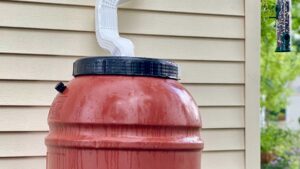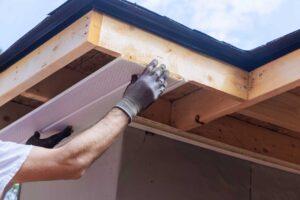Florida homeowners know the weather can change in an instant. Your gutters are your home’s first line of defense.
In a state where afternoon downpours, hurricane-force winds, and year-round humidity are the norm, proper gutter systems aren’t optional—they’re essential. Without reliable gutters, rainwater can wreak havoc on your property, leading to foundation issues, roof damage, and costly repairs.
If you’re building a new home or upgrading your current system, this guide breaks down exactly what to consider when choosing the right gutters to protect your Florida home from water damage.
Why Gutters Are Critical in Florida
Florida’s subtropical climate delivers a high volume of rainfall, especially during hurricane season from June to November. One inch of rain on an average-size roof can produce more than 1,200 gallons of runoff. That’s a lot of water potentially pouring toward your foundation.
Without a well-designed gutter system to capture and redirect rainwater:
- Water pools around your foundation
- Landscaping erodes
- Soffits, fascia, and siding absorb moisture
- Mold and mildew begin to spread
Gutters are designed to solve this problem—but not all systems are created equal, and not all are suited for Florida’s unique weather patterns.
What Makes a Gutter “Right” for Florida Homes?
Here are the features Florida homeowners should prioritize:
1. Seamless Gutters
Unlike sectional systems, seamless gutters are fabricated in continuous lengths, reducing the chances of leaks. This design is crucial in Florida, where heavy rain can overwhelm poorly joined gutter segments.
2. Durable, Corrosion-Resistant Materials
Choose aluminum or coated steel gutters that resist rust, even in humid or coastal areas where salt exposure accelerates corrosion.
3. Proper Sizing for Heavy Rainfall
Florida homes often benefit from oversized 6-inch gutters rather than standard 5-inch systems. The wider design handles more water flow and reduces overflow during storms.
4. Strategic Downspout Placement
Downspouts should be correctly positioned to move water away from your foundation. Extensions or underground drainage may be needed to avoid flooding low-lying areas.
Why DIY Installations Often Fall Short
Installing gutters isn’t as simple as it may appear. In Florida, improper pitch, poor fastening, or incorrect sizing can lead to:
- Overflow during storms
- Leaks at joints or corners
- Pulling away from the fascia
- Water damage that voids your roof warranty
Working with a licensed professional ensures your system is custom-cut, properly pitched, and anchored securely to withstand Florida’s frequent storms and high winds.
Gutter Guards: Worth It in the Sunshine State?
Absolutely. Leaf guards or mesh covers help prevent blockages from:
- Oak and palm debris
- Moss and organic buildup
- Hurricane-blown roof grit and tree branches
By preventing clogs, gutter guards reduce maintenance and keep water flowing freely when it matters most—during torrential downpours and back-to-back storms.
Protecting Your Home: Beyond the Gutters
A full water management system may also include:
- Downspout extensions to direct water well away from your home
- Rainwater collection systems for irrigation (a popular eco-friendly option in Florida)
- Soffit and fascia repair, as these areas are common entry points for moisture and pests
When installed together, these components create a comprehensive defense against water damage.
Final Thoughts
When it comes to Florida homes, the right gutter system is not just an upgrade—it’s protection. From daily rain to hurricane events, the right installation can mean the difference between a dry, well-preserved home and one facing mold, flooding, or foundation failure.
Whether you live in Wesley Chapel, Dade City, Zephyrhills, or anywhere in East Pasco County or North Tampa, a professionally installed, seamless gutter system is one of the smartest investments you can make.



